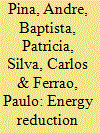| Srl | Item |
| 1 |
ID:
128335


|
|
|
|
|
| Publication |
2014.
|
| Summary/Abstract |
The increase of fossil fuel demand raises concerns on availability of resources for future energy demand and on potential environmental impacts. Electric vehicles (EVs) appear as one alternative to shift from fossil fuels to renewable energy resources. This research work analyzes the benefits of the introduction of EVs in a small energy system, the Flores island, Azores, in terms of primary energy and CO2 emissions. Four scenarios were designed considering different penetration rates of EVs (Low and High) and different time of recharging strategies (Fixed and Flexible). The high shares of RES in the electricity production system (60-62%) did not guarantee a significant use of RES for the recharging of EVs (10-40%), as the additional electricity required had to be produced mainly from the diesel generators. The flexible recharging strategies allowed doubling the share of RES in the recharging of the EVs when compared to fixed recharging, and consequently double the impact on the reduction of primary energy consumption and fossil fuels imports. While the reduction of primary energy ranged between 0.2% and 1.1%, for CO2 emissions there was a decrease between 0.3 and 1.7%, proving that EVs can help improve the sustainability of energy systems.
|
|
|
|
|
|
|
|
|
|
|
|
|
|
|
|
| 2 |
ID:
109312


|
|
|
|
|
| Publication |
2011.
|
| Summary/Abstract |
A small fleet of classic London Taxis (Black cabs) equipped with hydrogen fuel cell power systems is being prepared for demonstration during the 2012 London Olympics.
This paper presents a Life Cycle Analysis for these vehicles in terms of energy consumption and CO2 emissions, focusing on the impacts of alternative vehicle technologies for the Taxi, combining the fuel life cycle (Tank-to-Wheel and Well-to-Tank) and vehicle materials Cradle-to-Grave.
An internal combustion engine diesel taxi was used as the reference vehicle for the currently available technology. This is compared to battery and fuel cell vehicle configurations. Accordingly, the following energy pathways are compared: diesel, electricity and hydrogen (derived from natural gas steam reforming).
Full Life Cycle Analysis, using the PCO-CENEX drive cycle, (derived from actual London Taxi drive cycles) shows that the fuel cell powered vehicle configurations have lower energy consumption (4.34 MJ/km) and CO2 emissions (235 g/km) than both the ICE Diesel (9.54 MJ/km and 738 g/km) and the battery electric vehicle (5.81 MJ/km and 269 g/km).
|
|
|
|
|
|
|
|
|
|
|
|
|
|
|
|